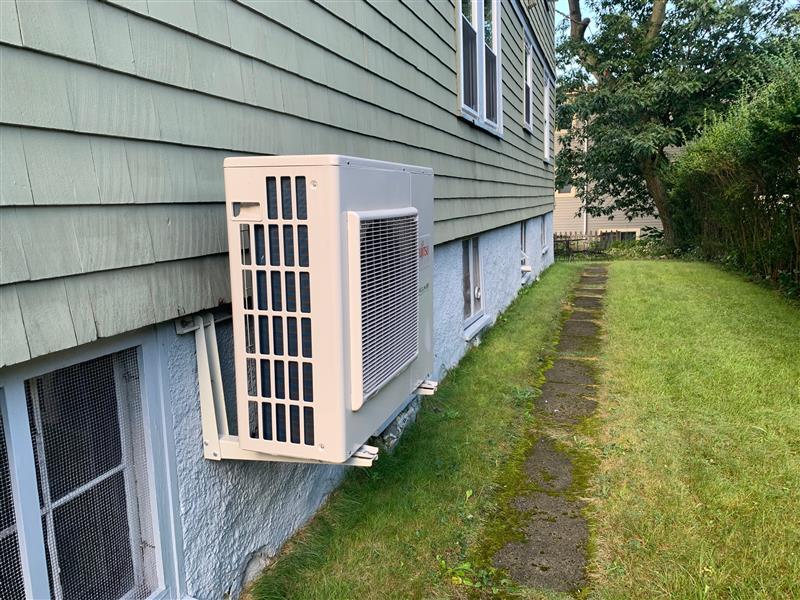The Massachusetts Clean Energy Center (MassCEC) has implemented a pilot program for residential heat pumps, between May 2019 and June 2021, to ascertain if these systems are able to meet 100% of a household's heating needs in cold climates.
Through the Whole-Home Heat Pump pilot program, the research center offered existing homes that switched from gas, or new and rebuilt homes with no fossil fuel appliances, a flat incentive of $2,500 per home to install a whole-home system, which it claims eliminates the need to maintain fossil fuel pipes or tanks and a second heating system.
The pilot program also provided higher incentives for lower-income customers and, at its final stage, included other efficiency or electrification measures as part of the heat pump project. Overall, funds were awarded to 68 whole-home heat pump projects, of which 31 were new construction projects and 137 retrofit projects, with a total of 39 installers participating in the pilot.
“The primary lesson learned is that whole-home heat pumps are a feasible solution, not only for new construction but also for retrofitting existing buildings, including older homes,” the MassCEC said. “We surveyed pilot customers six months after project completion and 95% of respondents were somewhat, or fully satisfied with the level of comfort for heating, while all were somewhat, or fully satisfied with the level of comfort for cooling.”
The institute's experts, however, found that heat pump project costs were higher than expected, at $18,400 per system, with projects being less expensive in new homes than in retrofits, which they explained by the smaller loads of new constructions and the smaller size of the required heat pumps.
In new homes, the average cost was around $14,000, and in existing buildings and retrofits, $20,000. “Of the retrofit projects in our pilot, 25% required an electric service upgrade while 38% reported that their natural gas heating system also provided their domestic hot water, which meant that homeowners either had to leave their natural gas boiler in place just to heat their hot water or else buy a new hot water heater as part of the project,” they further explained.
Several case studies were analyzed by the research institute and information was constantly collected from homeowners and contractors. “Our hope is that costs for whole-home heat pumps projects will go down as installers become more comfortable with the capabilities of heat pumps and manufacturers offer more options,” the experts stated, noting that pubic incentives will still be necessary to drive demand and reduce production and installation costs.
According to a recent study from the University of Maryland, College Park; the University of Rhode Island; and Carnegie Mellon University, installing an air source heat pump may increase a home’s value by up to 7.1% in 23 states of the United States. The price premium is estimated at between $10,400 and $17,000 per transaction, and the average cost for installing an air source heat pump was estimated by that study to be around $8,000.
This content is protected by copyright and may not be reused. If you want to cooperate with us and would like to reuse some of our content, please contact: editors@pv-magazine.com.




Can you provide a link to the study so readers can see more detail about the responses? How transparent is the study?
Hey John,
here the link: https://www.masscec.com/blog/2021/09/13/masscec-pilot-showcases-success-whole-home-heat-pumps#Case_Studies
Very informative have 3 heat pump in a 1200sq feet home. The 40 year old construction. Had a 18000btu. And 2 12000btu. The configuration of the home need this amount. Looking forward for the winter to see how the system heats. Did a great job cooling. Nova Scotia. Canada. Bridgewater
A very informative blog on RE and sustainability
This article ignores the major drawback that heat pumps can not provide hot water. It only gets mentioned in the last few lines This means any conversion has not also add in the additional cost of water heating by electricity
The costing numbers still confirm that any heat pump conversion in an exiting house is prohibitively expensive,and would likely also need an upgrade the existing radiators sizes plus he current electricity distribution network locally
One home I have seen has a heat pump “Furnace” with all the ducting needed for its efficient operation. Their is a backup electric furnace which cuts in at low temperatures (usually at around -15C and lower) and the unit also extracts heat for hot water in the summer. The owner said it is rated at about 45% efficient since the summer cooling becomes the hot water heater. This type of unit can replace a conventional oil or gas unit since the ducting is already in place.